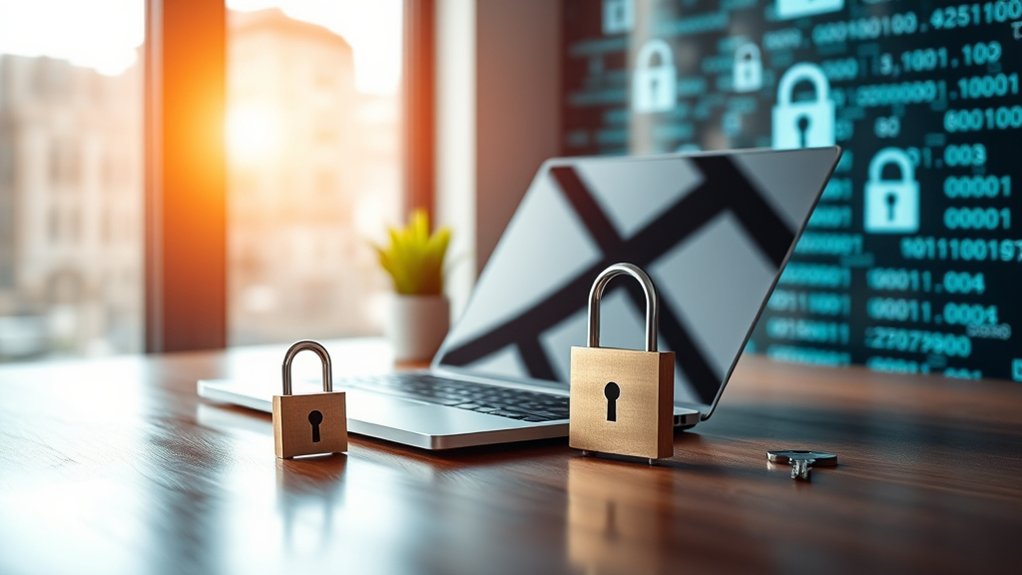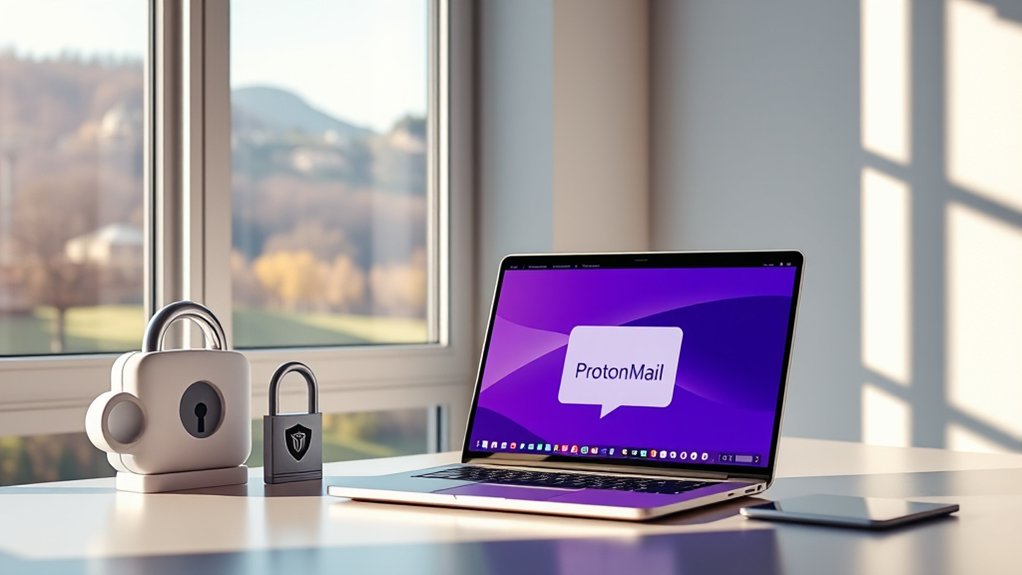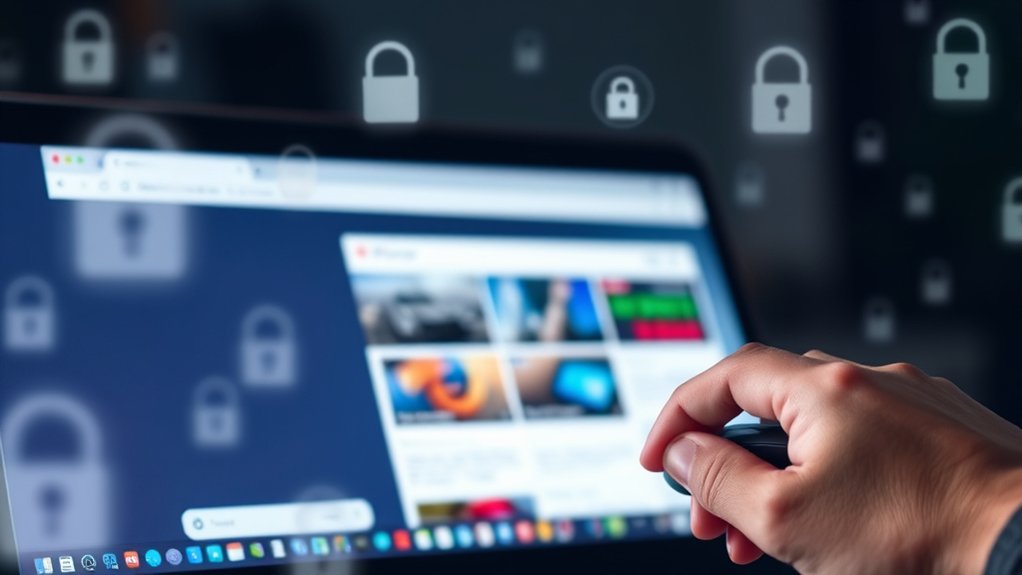ProtonMail is recognized as the most secure email service available today. It features strong end-to-end encryption and a strict zero-access encryption policy that protects user data from unauthorized access. Operating under Swiss privacy laws, ProtonMail guarantees compliance and offers both free and premium plans starting at $5 monthly. Its encryption methods include OpenPGP and AES standards, which greatly improve security. Users who investigate further may uncover additional features and comparisons with other email services.

In an era increasingly defined by digital communication, secure email services have emerged as crucial tools for safeguarding personal and professional information. Among the various providers, ProtonMail stands out as the most secure email service currently available. This platform is renowned for its end-to-end encryption and zero-access encryption policy, ensuring that even ProtonMail cannot access users’ stored data. Such features are pivotal in mitigating the risks associated with data breaches and privacy violations. In March 2025, ProtonMail is offering 38% off their premium plans, making it an even more attractive option for security-conscious users. Furthermore, ProtonMail’s commitment to privacy is underscored by its data storage in Switzerland, governed by strong privacy laws.
StartMail is another commendable option, offering end-to-end encryption and the ability to send encrypted messages to non-subscribers, improving usability without compromising security. Tutanota distinguishes itself with automatic end-to-end encryption and effective spam filtering, making it a strong contender for users who prioritize both functionality and safety. Hushmail, suited well for personal and professional use, likewise provides significant encryption capabilities, ensuring users’ communications remain private.
StartMail enhances usability with encrypted messaging for non-subscribers, while Tutanota and Hushmail focus on seamless security and privacy.
In assessing the features that bolster security, end-to-end encryption leads the list, as it guarantees that only the intended senders and recipients can read the messages. The incorporation of two-factor authentication adds an important layer of protection, further decreasing the likelihood of unauthorized account access. Metadata stripping and header blocking are critical advancements, aimed at reducing tracking risks that accompany digital correspondence. Additionally, many secure email providers utilize OpenPGP encryption standards, which further enhances communication security.
The distinct email encryption methods employed by providers include OpenPGP, alongside AES and RSA encryption standards, which fortify the communications. Moreover, cloud storage encryption and self-destructing emails have gained traction, providing users with more control over their information.
Regarding compliance, secure email providers such as ProtonMail and Tutanota utilize data centers in Switzerland and Germany, respectively, benefiting from stringent privacy laws. Whereas ProtonMail offers both free and paid plans starting at $5 monthly, competing platforms such as StartMail require a more substantial upfront payment, reflecting the varying market strategies in the sphere of secure email services.
Frequently Asked Questions
How Do Secure Email Services Protect Against Phishing Attacks?
Secure email services employ a variety of mechanisms to combat phishing attacks. Key strategies include domain-based message authentication and advanced content analysis, which help identify fraudulent emails.
Spam filters block potential phishing attempts before they reach inboxes. Moreover, anti-phishing features warn users of suspicious content.
Utilizing multi-factor authentication further complicates unauthorized access, emphasizing the significance of user education in recognizing phishing schemes, as noted by cybersecurity experts in industry reports.
Are There Any Free Secure Email Options Available?
Free secure email options are available, catering to privacy-conscious users.
ProtonMail offers a free plan with 500 MB of storage, maintaining end-to-end encryption.
Tuta provides 1 GB of storage with similar encryption measures.
Furthermore, Mailfence allows 1 GB of storage and ensuring data privacy.
Each of these services includes fundamental security features, such as two-factor authentication, even though users may encounter limitations on storage space and daily messaging capabilities.
Can Secure Email Services Be Used on Mobile Devices?
Secure email services can certainly be utilized on mobile devices, providing significant advantages in privacy and functionality. Major providers, such as ProtonMail and Tutanota, offer dedicated applications for Android and iOS.
These applications feature end-to-end encryption and intuitive interfaces, ensuring user accessibility and data protection. Furthermore, services typically include multi-platform compatibility, ensuring users can communicate securely across devices, reinforcing their commitment to user privacy and convenience in managing sensitive correspondence as they are on the go.
How Does End-To-End Encryption Work in Emails?
End-to-end encryption in emails operates through a dual-key system.
The sender encrypts messages using a public key, allowing only the designated recipient, possessing the matching private key, to decrypt and read them. This method guarantees that email servers cannot access the content, greatly enhancing privacy and security.
Common protocols such as PGP and S/MIME facilitate this encryption, making it an ideal choice for individuals and businesses seeking strong protection against unauthorized access.
Is Using a Secure Email Service Necessary for Personal Emails?
The necessity of using a secure email service for personal communications is increasingly recognized.
With end-to-end encryption and protective features, these services mitigate risks associated with data breaches and surveillance. Experts note that secure email can considerably improve privacy, reducing exposure to spam and phishing attacks.
For instance, in 2022, cyberattacks on personal email accounts rose by 30%. Consequently, employing secure platforms becomes crucial for safeguarding sensitive information and ensuring personal communication integrity.








